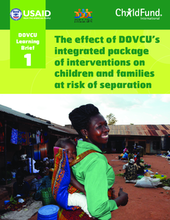“Deinstitutionalization of Orphans and Vulnerable Children in Uganda” (DOVCU) was a three-year project (2014-2017) that aimed to keep and reintegrate children into the care of families. ChildFund International led the consortium of project partners, including Transcultural Psychosocial Organization (TPO Uganda), Child’s i Foundation (CiF) and Retrak. Together, DOVCU project partners delivered an integrated package of interventions with the aim of decreasing household vulnerabilities for 1) households at risk of child separation, and 2) households with children reintegrating from CCIs. The project also aimed to strengthen the institutional capacities of government officials and other key stakeholders to successfully adapt the Alternative Care Framework and strive toward family-based care for all children.
This learning brief analyzes quantitative data from the first of the project’s stated objectives: examining the extent to which DOVCU project interventions decrease vulnerabilities for households and children at risk of separation. Figure 1 illustrates an ecological framework for addressing child separation, highlighting the multidimensional nature of risk and the need for integrated service delivery. This brief will examine ChildFund’s approach to addressing vulnerability at the family level, complementing other efforts to evaluate DOVCU’s macro-level work.
Read the Final Report of the DOVCU Project here.

